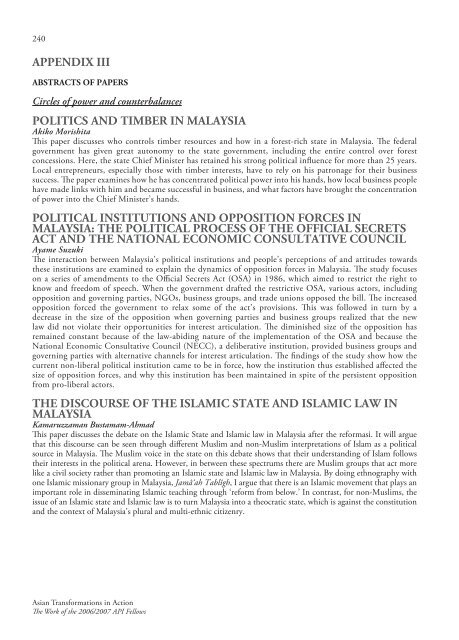Asian Transformations in Action - Api-fellowships.org
Asian Transformations in Action - Api-fellowships.org
Asian Transformations in Action - Api-fellowships.org
Create successful ePaper yourself
Turn your PDF publications into a flip-book with our unique Google optimized e-Paper software.
240APPENDIX IIIABSTRACTS OF PAPERSCircles of power and counterbalancesPOLITICS AND TIMBER IN MALAYSIAAkiko MorishitaThis paper discusses who controls timber resources and how <strong>in</strong> a forest-rich state <strong>in</strong> Malaysia. The federalgovernment has given great autonomy to the state government, <strong>in</strong>clud<strong>in</strong>g the entire control over forestconcessions. Here, the state Chief M<strong>in</strong>ister has reta<strong>in</strong>ed his strong political <strong>in</strong>fluence for more than 25 years.Local entrepreneurs, especially those with timber <strong>in</strong>terests, have to rely on his patronage for their bus<strong>in</strong>esssuccess. The paper exam<strong>in</strong>es how he has concentrated political power <strong>in</strong>to his hands, how local bus<strong>in</strong>ess peoplehave made l<strong>in</strong>ks with him and became successful <strong>in</strong> bus<strong>in</strong>ess, and what factors have brought the concentrationof power <strong>in</strong>to the Chief M<strong>in</strong>ister’s hands.POLITICAL INSTITUTIONS AND OPPOSITION FORCES INMALAYSIA: THE POLITICAL PROCESS OF THE OFFICIAL SECRETSACT AND THE NATIONAL ECONOMIC CONSULTATIVE COUNCILAyame SuzukiThe <strong>in</strong>teraction between Malaysia’s political <strong>in</strong>stitutions and people’s perceptions of and attitudes towardsthese <strong>in</strong>stitutions are exam<strong>in</strong>ed to expla<strong>in</strong> the dynamics of opposition forces <strong>in</strong> Malaysia. The study focuseson a series of amendments to the Official Secrets Act (OSA) <strong>in</strong> 1986, which aimed to restrict the right toknow and freedom of speech. When the government drafted the restrictive OSA, various actors, <strong>in</strong>clud<strong>in</strong>gopposition and govern<strong>in</strong>g parties, NGOs, bus<strong>in</strong>ess groups, and trade unions opposed the bill. The <strong>in</strong>creasedopposition forced the government to relax some of the act’s provisions. This was followed <strong>in</strong> turn by adecrease <strong>in</strong> the size of the opposition when govern<strong>in</strong>g parties and bus<strong>in</strong>ess groups realized that the newlaw did not violate their opportunities for <strong>in</strong>terest articulation. The dim<strong>in</strong>ished size of the opposition hasrema<strong>in</strong>ed constant because of the law-abid<strong>in</strong>g nature of the implementation of the OSA and because theNational Economic Consultative Council (NECC), a deliberative <strong>in</strong>stitution, provided bus<strong>in</strong>ess groups andgovern<strong>in</strong>g parties with alternative channels for <strong>in</strong>terest articulation. The f<strong>in</strong>d<strong>in</strong>gs of the study show how thecurrent non-liberal political <strong>in</strong>stitution came to be <strong>in</strong> force, how the <strong>in</strong>stitution thus established affected thesize of opposition forces, and why this <strong>in</strong>stitution has been ma<strong>in</strong>ta<strong>in</strong>ed <strong>in</strong> spite of the persistent oppositionfrom pro-liberal actors.THE DISCOURSE OF THE ISLAMIC STATE AND ISLAMIC LAW INMALAYSIAKamaruzzaman Bustamam-AhmadThis paper discusses the debate on the Islamic State and Islamic law <strong>in</strong> Malaysia after the reformasi. It will arguethat this discourse can be seen through different Muslim and non-Muslim <strong>in</strong>terpretations of Islam as a politicalsource <strong>in</strong> Malaysia. The Muslim voice <strong>in</strong> the state on this debate shows that their understand<strong>in</strong>g of Islam followstheir <strong>in</strong>terests <strong>in</strong> the political arena. However, <strong>in</strong> between these spectrums there are Muslim groups that act morelike a civil society rather than promot<strong>in</strong>g an Islamic state and Islamic law <strong>in</strong> Malaysia. By do<strong>in</strong>g ethnography withone Islamic missionary group <strong>in</strong> Malaysia, Jamâ‘ah Tablîgh, I argue that there is an Islamic movement that plays animportant role <strong>in</strong> dissem<strong>in</strong>at<strong>in</strong>g Islamic teach<strong>in</strong>g through ‘reform from below.’ In contrast, for non-Muslims, theissue of an Islamic state and Islamic law is to turn Malaysia <strong>in</strong>to a theocratic state, which is aga<strong>in</strong>st the constitutionand the context of Malaysia’s plural and multi-ethnic citizenry.<strong>Asian</strong> <strong>Transformations</strong> <strong>in</strong> <strong>Action</strong>The Work of the 2006/2007 API Fellows
















